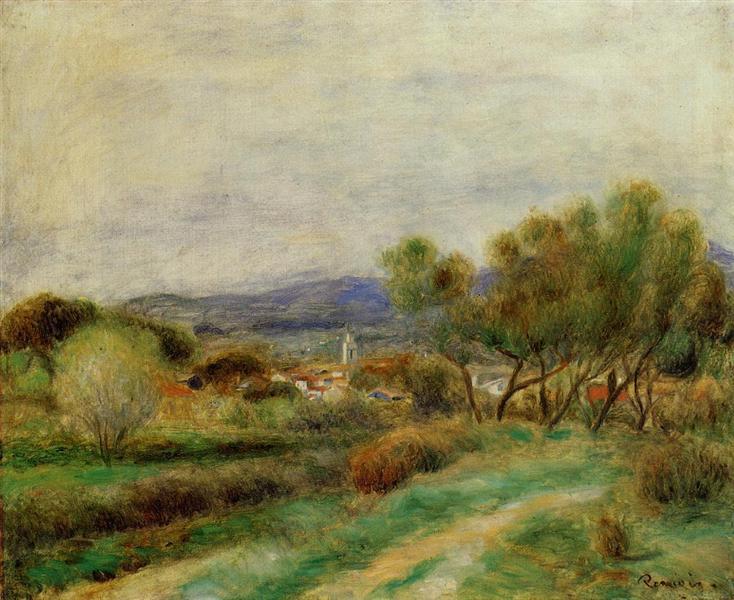Tanım
Pierre-Auguste Renoir's "View of La Sayne" created in 1890 is a splendid example of the French Impressionist master's style, characterized by his focus on light, color, and everyday life. In this painting, Renoir captures an idyllic landscape that evokes a serene and contemplative atmosphere. The scene is set against the natural backdrop of the La Sayne region, one of the many locations Renoir chose to capture the beauty of the French countryside.
From the first glance, one is drawn into the vibrant use of color that characterizes this work. The palette is rich in shades of green and blue that bring the surrounding vegetation and sky to life. The loose, dynamic brushstrokes, typical of Renoir, bring a sense of movement that suggests the gentle breeze that might be caressing the landscape. Light filters through the branches, creating a play of chiaroscuro that adds depth and texture to the painting.
The composition focuses on a path that meanders through the scene, leading the viewer’s gaze into the background of the painting. The shadows cast on the path, along with the leafy trees on either side, create a sense of closeness and enveloping. This clever use of composition not only visually organizes the work, but also invites introspection, evoking a desire to explore the space at hand.
While there are no prominent human figures in View of La Sayne as often found in Renoir's other works, the absence of characters does not diminish the emotional impact of the painting. Instead, nature becomes the protagonist, suggesting a moment of stillness and peace. This choice can be interpreted as an affirmation of the artist's relationship with nature, a recurring theme in his later work. Without the distraction of the human figure, the viewer feels almost compelled to contemplate the beauty of the natural surroundings.
The work is set in the final stage of Renoir's career, a period when his style had evolved towards a greater simplification of forms and a deep interest in light and colour. This shift coincides with his realisation of a large number of landscapes, reflecting his desire to capture the ephemeral essence of life and the moment, a fundamental principle of Impressionism. Compared to other contemporary works by landscape painters of his era, View of La Sayne captures an authenticity and freshness that has remained resonant over time.
Furthermore, it is interesting to consider that Renoir, despite wishing to be more in touch with nature, was also struggling with health issues at this stage of his life, which adds a layer of depth to his work. Through “View of La Sayne,” Renoir not only offers a depiction of a specific place, but also shares a part of his internal state, translating his appreciation for the natural world into a visual language that has endured throughout art history.
Ultimately, View of La Sayne represents much more than just a landscape. It is a testament to Renoir's legacy and his search for beauty in the everyday. Through his exceptional mastery of color and light, Renoir manages to transport us to a place where time seems to stand still, allowing us to enjoy the calm and majesty of nature. This work, in its simplicity and complexity, remains a milestone in the canon of Impressionist art, a reflection of a period when art began to celebrate the beauty of the world as it is presented before our eyes.
KUADROS ©, a famous painting on your wall.
Hand-made oil painting reproductions, with the quality of professional artists and the distinctive seal of KUADROS ©.
Painting reproduction service with satisfaction guarantee. If you are not completely satisfied with the replica of your painting, we will refund 100% of your money.

